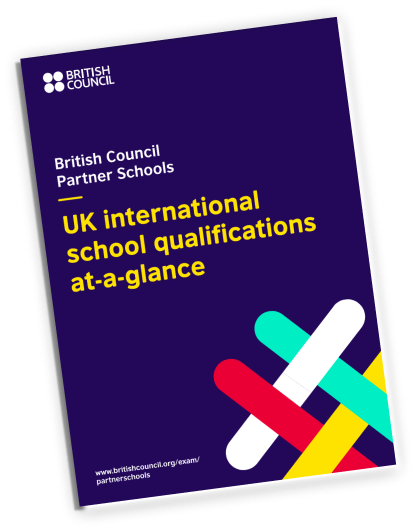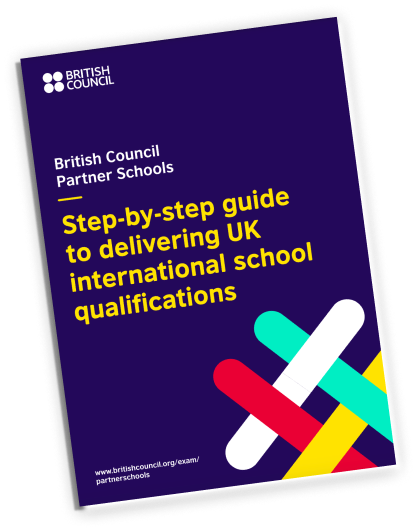Guide to UK international school qualifications
Globally, parents and schools choose UK international school qualifications due to their worldwide recognition. These qualifications expand students' choices and provides access to top universities both locally and abroad.
As a result, holding a UK international school qualification not only facilitates entry into prestigious universities but also opens doors to global opportunities and career prospects, contributing to a satisfying and prosperous life.
UK international school qualifications are:
- International O Level, International GCSE, International AS and International A Level qualifications which are developed by UK-based awarding bodies
- Delivered by 12,000 schools worldwide
- Recognised by top-ranked universities across the globe
In this guide, you’ll learn more about UK international school qualifications. We’ll detail the educational benefits of these qualifications, look at what schools need to do to become approved, and explain how the British Council supports its network of Partner Schools.
UK international school qualifications at a glance
UK international school qualifications are designed to offer a balance between breadth and depth in the curriculum. Students are furnished with the analytical, creative, and emotional skills they need to pursue a successful further education and rewarding employment.
UK international school qualifications are the most popular international school qualifications globally. These include International O Levels, International GCSEs, International AS Levels and International A Levels.
International GCSEs (International General Certificate of Secondary Education)
International GCSEs are UK international school qualifications taken by students aged 14–16. International GCSEs cover a broad and balanced curriculum with the option to choose from a range of subjects. The wide variety of subjects offered allows students to study topics that suit their interests and future career aspirations. Depending on the subject, International GCSE assessment includes written exams, oral presentations, practical assessments, and coursework.
International O Levels (Ordinary Levels)
International O Levels are international qualifications equivalent to International GCSEs for students aged 14–16. They play a crucial role in assessing students' understanding in different areas, facilitating progression to more advanced studies. Assessments include written exams and practical tests, tailored to measure students' proficiency and readiness for the next educational step.
International AS Levels (Advanced Subsidiary Levels)
International AS Levels are taken after International GCSEs and are well-received as university entrance requirements for many courses. Typically taken over one year, International AS Levels require students to narrow their focus and engage in deep study and independent analytical thinking. International AS Levels are assessed through end-of-year written examinations, with some subjects requiring coursework and oral examinations.
International A Levels (Advanced Levels)
Students who have been awarded their International AS Levels may wish to continue their course of study for an additional year to attain full International A Levels. This will largely depend on what a student wishes to study and which university they hope to attend. International A Levels are rigorous and in-depth, encouraging students to build subject matter mastery in their chosen fields. International A Levels are considered gold-standard university entrance qualifications and are highly regarded by top-ranked universities around the world.

Download our guide
Download the guide for a detailed overview of UK international school qualifications.
Educational benefits of UK international school qualifications
UK international school qualifications offer educational excellence through a flexible international curriculum. The benefits for students, parents, and schools include the following:
Achievable and accessible for a range of students
UK international school qualifications deliver high-quality education by means of a supportive learning environment, excellent teaching standards, and a balanced workload. As the most popular international school qualification in the world, the system is proven to be accessible to a wide range of students from varying backgrounds.
Flexible curriculum offering a wide range of subjects
UK international school qualifications are based on a broad, flexible curriculum. International GCSE subjects are chosen from a possible range of over 70 subjects and International A-Level subjects are chosen from a possible 50. This flexibility makes for a diverse and well-rounded educational experience that can be tailored to each student’s strengths, interests, environment, and aspirations.
Culturally sensitive and inclusive
UK international school qualifications curriculum adopts an international outlook that is culturally sensitive and inclusive. The syllabus is designed to be easily integrated with local curriculum and adapted to local contexts.
Student-centred learning environment
International GCSEs and International A Levels are taught with a student-centred classroom approach. This approach encourages students to actively participate in and direct their learning experience, thereby developing students’ independent problem-solving, analytical, and critical thinking skills. Student-centred learning focuses on skills building and aims to produce self-motivated, capable learners.
Teaches deep subject learning and conceptual understanding
International AS Levels and International A Levels in particular require students to strive for subject matter mastery of their chosen subjects through deep study and independent analytical and creative thinking. The ability to delve deeply into subject matter, grasp complex material, and engage higher order thinking skills stands students in excellent stead for university studies.
Highly standardised, regulated, and credible
There are currently three UK-based awarding bodies delivering globally trusted international qualifications such as International GCSE, International AS Levels, and International A Level qualifications across the globe. All schools offering UK international school qualifications adhere to a standardised structure, assessment model, and grading system. The involvement of these organisations guarantees the fairness, consistency, and credibility of assessments.
Exceptional school and teacher support from UK-based awarding bodies
The UK-based awarding bodies delivering International GCSEs and International AS Levels and International A Levels offer high levels of support for schools and teachers. This includes subject related extensive teacher training, administrative support and more.
Recognised and respected by the world’s top universities
International A Levels are widely considered to be gold-standard university entrance qualifications and UK international school qualifications are recognised and respected by top-ranked universities across the globe.

Understanding UK-based awarding bodies
UK-based awarding bodies work with over 12,000 schools in over 160 countries to deliver International GCSEs, International AS Levels, and International A Levels to a diverse range of international students. All UK-based awarding bodies are committed to upholding high standards of educational excellence and supporting schools, teachers, and learners.
The following UK-based awarding bodies assist and support schools in delivering UK international school qualifications:
The British Council and UK-based awarding bodies work together to provide expert support to schools delivering UK international school qualifications.
We work collaboratively with UK-based awarding bodies to maintain the educational standards of UK international school qualifications worldwide. Together, we provide a robust framework that supports schools in delivering high-quality education that equips learners for future challenges. By working with the British Council and UK-based awarding bodies, schools enjoy the collective expertise and guidance of highly respected and expert organisations — and a well-managed journey to delivering UK international school qualifications like International GCSEs and International A Levels.
Offering UK international school qualifications
Step 1: Research UK-based awarding bodies
Find out which UK-based awarding body best aligns with your school’s values, mission, and capabilities. Details can be found at the following websites:
If your school needs initial guidance on introducing UK international school qualifications, the British Council can provide information on the application process with your chosen UK-based awarding body.
Step 2: Consult key stakeholders
Consult parents and teachers to assess the demand for UK international school qualifications at your school. It is essential to secure buy-in from important stakeholders before embarking on an approval journey.
Step 3: Understand your UK-based awarding body’s requirements
Evaluate the feasibility of introducing these qualifications in your school by ensuring that you have the resources and faculty expertise required by your UK-based awarding body.
Step 4: Upskill teachers and upgrade resources
Your chosen UK-based awarding body and the British Council can assist with teacher training, staff development, and the upgrading of educational resources and infrastructure. Contact the British Council for guidance.
Step 5: Have patience
Aim to make the transition slowly and meticulously. Attempting to transition too quickly can result in poor initial results and a loss of stakeholder support.

Download our guide
Download the step-by-step guide to delivering UK international school qualifications.
How the British Council can help
Over 2,600 schools across the world have partnered with the British Council to deliver UK international school qualifications. We offer multifaceted support to our Partner Schools, allowing them to focus their energy where it belongs: on teaching and learning.
Here is some of the support the British Council provides schools:
We assist schools through the application process, managing document collection and ensuring compliance with the requirements of UK-based awarding bodies.
We work together with UK-based awarding bodies to help schools adopt and maintain the highest educational standards.
We facilitate the secure and efficient administration of exams, enabling schools to focus more on teaching and less on managing exam logistics.
We provide additional professional development opportunities, enhancing the skills and knowledge of teachers and staff
We offer personalised account management, ensuring each school receives support tailored to its unique needs
We offer networking and collaboration opportunities through our extensive network of British Council Partner Schools, enabling schools to connect and share best practices globally.
FAQs
Here are some frequently asked questions about offering UK international school qualifications.
Do our teachers need additional training to teach UK international school qualifications effectively?
Do our teachers need additional training to teach UK international school qualifications effectively?
Yes. Teachers will need training to understand the curriculum and teaching methods specific to UK international school qualifications. The British Council offers all Partner Schools exclusive access to its professional development hub that hosts an extensive range of high-quality resources and support.
How do we align our curriculum with UK international school qualifications standards?
How do we align our curriculum with UK international school qualifications standards?
UK-based awarding bodies provide curriculum related material and training support to schools wishing to offer UK international school qualifications. The British Council also provides personalised onboarding support to Partner Schools during the implementation phase.
How do UK international school qualifications compare with other international qualifications?
How do UK international school qualifications compare with other international qualifications?
While the IB and US international school qualifications are globally recognised educational pathways, UK international school qualifications remain the most popular international school qualifications in the world. Taught in over 12,000 schools in more than 160 countries, International GCSEs, International AS Levels, and International A Levels are developed by UK-based awarding bodies associated with prestigious institutions including Cambridge International Education, OxfordAQA, and Pearson Edexcel.
How does the British Council support learning experiences and educational outcomes?
How does the British Council support learning experiences and educational outcomes?
The British Council supports schools in preparing students for UK international school qualifications. We offer professional development pathways, teacher training, online learning platforms with interactive study resources, safeguarding resources, support and access to higher education in the UK. Further support is provided for curriculum enrichment and developing core skills through programmes such as Action Research Grants, Your World competition and Partner Schools Connect.
Improve your educational outcomes
with the help of UK education experts
For decades, UK international school qualifications have helped unlock academic and career opportunities for students around the world. The British Council is a globally trusted education partner that supports schools in their journey to offering UK international school qualifications.
Contact the British Council today for more information on how we can support your school in its journey to becoming an approved provider of UK international school qualifications.
